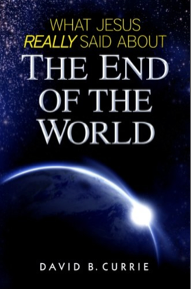It is rather understandable when nonbelievers and skeptics look at the New Testament and come to an understanding that follows from a framework of doubt and skepticism. It is quite another for believers to take the exact same approach and to undermine reasons for faith. There is certainly a role to play for Christians as St. Paul said to “Test all things” and as St. Peter said to “Always be prepared to offer a reason for the hope that is within you.” Yet we get things like Jesus didn’t know he was God, that the miracle of the feeding of the multitude was one of sharing, and that Jesus and the Apostles expected the end if the world within their generation.
What flows from such misunderstandings is that doubt is cast onto Jesus and his Church as a result. Author David Currie had heard a Catholic college women saying that since Jesus was wrong about the time of the second advent that Jesus and thus the Church was wrong about other things such as abortion and contraception. The only good thing about such a serious misunderstanding is that it one of the impetus that caused David Currie to write a book on the subject.
It is one of those wonderful ironies of life that I finished David Currie’s new book What Jesus Really Said about the End of the World last night and am writing a review on the day of the much hyped Maya apocalypse. Although the fact that I read it during Advent is much more pertinent. This season that celebrates both the coming of Jesus in the incarnation and his future coming in the second advent.
This book illustrates how both the skeptics such as Bertrand Russell and the believers such C.S. Lewis could come to believe that Jesus and the Apostles were wrong about this specific subject. I have heard this idea multiple times myself and certain scriptural passages in isolation can appear to bear this out. I had already come to understand the idea that scripture can have multiple fulfillments such as in the book of Revelation where some events were relating to the persecution of that time and to the final eschaton. Multiple fulfillments really are quite common in scripture and I had thought that this same understanding would also apply to what Jesus and the Apostles said in this regard.
This book certainly has this understanding, but it really goes into detail to show how this is true and to break out when Jesus was talking about the destruction of the Temple in Jerusalem and when we was talking about his second coming. I was enthralled from the beginning and David Currie brought out components of scripture that really put these ideas into perspective and focus.
A large part of the book deals with the Gospel of Matthew and the olivet discourse where much of what we know on this topic is found. One of the errors we often make is to bring our ideas of learning and teaching and assume that the same had always been true. This error leads us to miss things that would have been apparent to a culture with primarily an oral teaching tradition that relied on a practiced memory since written forms of communication were both time consuming and expensive. I was fascinated to learn of things like bracketing were used where a subject would be bracketed by the same phrase to draw attention to what was in between and to set it apart. The whole structure of the olivet discourse and the somewhat parallels readings in Luke are rather amazing and once you understand this structure it provides the key to when Jesus was talking about the destruction of the Temple or the end of the world.
I would go into more technical details of this structure, but really I could only provide a poor summary and I would really encourage you to read it in this book. What you do find though is that Jesus answered the Apostles regarding these two questions and the two answers can be totally separated out leaving no doubt as to which scriptural replies matched up to what event. There were also other keys provided as to understand that there are really multiple comings of Christ which this book lays out. In fact the case is so destructive to the skeptics and the points made make it difficult to see how people could be confused about Jesus saying his second advent would be delayed.
While this book takes almost totally a scriptural approach there are references to the understanding of the Early Church Fathers which match and provide emphasis on how the ideas presented in this book are not new ones. So much of what the Church already knew gets lost over the years as people come up with ideas divorced from the past. I remember Scott Hahn once talking about coming up with a thrilling interpretation only to find it taught by the Church all along.
I thought David Currie did a masterful presentation on the subject and it will forever change the way I look at these passages now with greater insight. I highly recommend this book to a general audience as it is not just some dry scholarly tome. Scholarly certainly, but well worthwhile reading. The final summary also brings these ideas down to a personal level and how we are to relate to them.
<Insert mandatory REM reference to ” I read What Jesus Really Said about the End of the World and I feel fine”>












